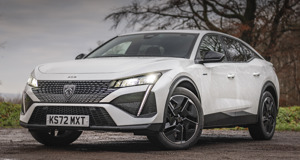Peugeot 408 Review 2025
Peugeot 408 At A Glance
Niche models are no longer limited to premium brands like Audi and BMW. Volkswagen's at it with the Taigo, the Renault Arkana is the obscure coupe-SUV no one asked for - and now the new Peugeot 408 is set to fill a gap between conventional hatchbacks and the hugely popular family SUV class.
The Peugeot 408 takes a similar approach to the new Citroen C5 X. It's a high-riding hatchback with a bold design and none of the compromises of an SUV. That's the theory, anyway.
Under the bonnet, the most affordable Peugeot 408 models come with a 1.2-litre petrol engine. This 130PS unit is sprightlier than you'd expect in a car this size, although we still think a lot of buyers will be looking at the plug-in hybrid motors instead.
There are two plug-in hybrids, each combining a 1.6-litre petrol engine with an electric motor. Crucially, they provide an electric-only range of up to 40 miles - good news for company car drivers seeking the tax advantages of long-range plug-in hybrids. If a pure-electric car appeals, there's also an all-electric Peugeot e-408 on its way later in 2023.
The Peugeot 408 feels a bit sportier than the Citroen C5 X, but that doesn't really come at the expense of comfort. It rides well, while its interior feels suitably upmarket for a brand that's attempting to steer customers away from premium brands.
You can choose from three core models: the Peugeot 408 Allure, Allure Premium and the top-spec 408 GT. We reckon the mid-spec Peugeot 408 Allure Premium makes the most sense - there's no need to spend serious money on a Peugeot 408.
Talking of which, you'll pay upwards of £31,000 for an entry-level car, while the plug-in hybrids are nudging £40,000. We're already seeing pre-reg discounts on Peugeot 408s, though, and we reckon the left-field approach will be good news for bargain hunters a few years down the line (if not for the first owners taking the depreciation hit).
If Peugeot's serious about tempting buyers out of their SUVs into a high-riding hatchback, the 408 needs to pack a punch in terms of practicality. And it certainly ticks that box - it's quite a long car, so the boot's pretty vast (although not as huge as, say, a Skoda Superb Estate's). You don't sit as high as you would in a 'proper' SUV, but neither can you feel the tarmac beneath your seat.
The most impressive thing about the new Peugeot 408 is the interior quality. It looks and feels pretty special, while the new 10.0-inch infotainment system (standard across the range) looks smart and is pretty easy to operate. We like the digital instrument cluster, too, although not so much the 3D dials fitted to the Peugeot 408 GT.
We reckon the Peugeot 408 will be overlooked by a lot of buyers searching for their next family car, but it certainly isn't without its merits. We love the interior, think it looks pretty sharp and its hybrid engines make it a pretty interesting alternative to mainstream competitors. We reckon the upcoming electric powertrain will only add to the 408's appeal.
Peugeot 408 handling and engines
- Engines range from 1.2 Puretech 130 to Hybrid 225
Peugeot 408 2025: Handling and ride quality
While the Peugeot 408 shares a platform with the Citroen C5 X, it does feel noticeably sportier than its relation. That's partly down to its diddy steering wheel - while the steering is quite light (and that's a good thing around town), it reacts very quickly to inputs so it feels very agile.
The suspension setup is slightly sportier than the Citroen's, too. That doesn't mean it's uncomfortable, but it remains surprisingly composed in corners. The lower centre of gravity compared to high-riding SUVs helps here, too.
You can't get a four-wheel-drive Peugeot 408, so you'll have to look elsewhere if you regularly traverse muddy fields or snowy rural lanes. There's loads of grip available, though, and even heavy-footed exits from junctions in slippery conditions shouldn't fluster the front wheels too much.
Peugeot 408 2025: Engines
There are three engines initially offered in the Peugeot 408: one petrol and two plug-in hybrids.
The petrol engine is the same 1.2-litre Puretech that we've seen elsewhere in the Peugeot range (not to mention in Vauxhall and Citroen models). It produces 130PS, which doesn't sound a great deal for a car of this size. But, while it's not going to hurtle you down a motorway sliproad, the Puretech 130 actually punches above its weight. Officially, it'll accelerate to 62mph in 10.4 seconds, but it feels punchier than that - helped by the relatively slick eight-speed automatic gearbox that's fitted as standard.
Perhaps more noteworthy is the option of two plug-in hybrid engines. Both pair a 1.6-litre petrol engine with a 12.4kWh battery pack powering a single electric motor. You can choose between a 180PS model badged the Peugeot 408 Hybrid 180, or a more powerful version packing 225PS and named the - you guessed it - Hybrid 225.
We're yet to sample the Hybrid 180 but, on paper, there's little reason to pay extra for the 225. The former takes 8.1 seconds to accelerate from a standstill to 62mph while the latter takes 7.8 seconds. The hybrid system works well, with only a moment's hesitation as the petrol engine kicks in. High-mileage drivers might be better looking for a diesel alternative but, if you can charge a car at home, the ability to drive around town under electric power is quite appealing.
If you're ready to make the jump to electric power, an all-electric Peugeot e-408 is due later in 2023.
Peugeot 408 2025: Safety
There's a long list of driver-assistance technology fitted available in the Peugeot 408, but that's not enough to warrant a five-star Euro NCAP safety rating. A 65 per cent score for safety assist features in the official crash tests led to an overall four-star rating, largely due to the autonomous emergency braking system struggling to avoid a collision with other vehicles.
Don't dismiss the Peugeot 408 as an unsafe car, though. Standard safety kit across the range includes the above camera-based emergency braking system (plug-in hybrid models get radar tech, too), while Allure Premium models and above get the Driver Assist Pack (with adaptive cruise control, rear cross-traffic alert and long-range blind spot detection).
Peugeot 408 2025: Towing
The petrol Peugeot 408 1.2 Puretech has a braked trailer towing capacity of 1200kg while the plug-in hybrid models can tow up to 1400kg. If you're looking to tow a caravan, we'd recommend a four-wheel-drive alternative like the Skoda Karoq (or bigger Skoda Kodiaq) instead.
| Engine | MPG | 0-62 | CO2 |
|---|---|---|---|
| 1.2 Puretech 130 | - | 10.4 s | 136 g/km |
| 1.2 Puretech 136 MHEV | - | - | 114 g/km |
| Hybrid 180 | - | - | 26 g/km |
| Hybrid 225 | - | - | 26 g/km |
Peugeot 408 interior
| Dimensions | |
|---|---|
| Length | 4687 mm |
| Width | 2062 mm |
| Height | 1478 mm |
| Wheelbase | 2787 mm |
Peugeot 408 2025: Practicality
Measuring 4687mm in length and 2062mm in width, the Peugeot 408 is actually quite a big car - certainly bigger than a Cupra Formentor or Renault Arkana.
That's obviously good news for interior space. It feels very roomy inside, especially for those on the front, while there's a generous amount of legroom for rear-seat passengers. Headroom in the back takes a knock (that's the sloping rear roofline) but kids will be more than happy back there.
You sit a bit higher than a conventional family hatchback, too, although you'd be better looking at a traditional SUV if you're looking for a properly high-up seating position.
The boot can carry 536 litres of luggage, although that drops to 471 litres in hybrid models. Speccing the optional Focal sound system knocks outright boot space, too - down to 508 litres in the petrol 408 or 454 litres in the hybrids.
The rear seats don't do anything fancy like slide or recline but they do split 60:40 should you need to drop them for more boot space. You can squeeze up to 1611 litres with the rear seats dropped (1545 litres in hybrids).
Peugeot 408 2025: Quality and finish
Peugeot is pitching its 408 as a contender in the premium market and the interior reflects this - it looks and feels very well finished with soft-touch materials aplenty.
It does depend a little on which model you choose, but even entry-level variants don't exactly feel like a base-spec rental car. All models come with part-leather-effect seat coverings, although only the top-spec Peugeot 408 GT is available with full Nappa leather (for a fee). The GT comes with a full-grain leather steering wheel, too, as well as plush carpet mats and personalisable ambient lighting - all adding to the upmarket vibe.
Peugeot 408 2025: Infotainment
The Peugeot 408 gets a 10.0-inch navigation screen as standard across the range. It's positioned in the centre of the dash, below the vents and angled slightly towards the driver. It's not quite as close to the driver's eye line as many sat-nav systems, but it looks less like an afterthought than those plonked on top of the dash.
We've sampled systems that are slightly more user-friendly but it's much slicker than Peugeot infotainment screens of old. If you don't like it, at least you can easily connect your phone and use Apple CarPlay or Android Auto instead.
Below the main infotainment screen is a bank of touch-sensitive buttons that can be configured to act as shortcuts to a variety of functions. These work pretty well, although we still miss old-fashioned buttons.
All Peugeot 408 trim levels come with a digital driver's display behind the steering wheel. This looks pretty cool, although we're not so keen on the 3D effect that's applied to top-spec 408 GT models. It's just a bit unnecessary and looks a bit fuzzy to our eyes.
Peugeot 408 value for money
Peugeot 408 2025: Prices
Peugeot 408 prices start from around £31,000 for an entry-level Allure with the 1.2-litre Puretech petrol engine, while you'll pay a hefty £9000 premium for a plug-in hybrid. There aren't many direct rivals for the Peugeot 408 but this strikes us as relatively good value for money considering the size of the car and the amount of standard equipment.
You'll pay a little more for a Peugeot 408 compared to the similar Citroen C5 X, but it's priced pretty much in line with family SUVs like the Volkswagen Tiguan. And we suspect it won't be long before the Peugeot 408 starts to hit the used market - we're already seeing discounts on nearly-new and pre-registered models.
Peugeot 408 2025: Running Costs
Buy a Peugeot 408 1.2-litre Puretech and you should see up to 48.1mpg according to WLTP fuel economy tests. That's quite a respectable figure for a petrol engine although, like a lot of small turbocharged units, you might need to lower your expectations slightly in the real world.
Plug-in hybrid versions of the Peugeot 408 officially return up to 270mpg but, again, that figure is best treated with a dose of scepticism - particularly if you're planning on covering long journeys without stopping to charge regularly.
Peugeot quotes an electric range figure of 40 miles for the 408. That means it drops into a lower tax band for company car drivers compared to those PHEVs with a range of 39 miles or less. A 7.4kW home wallbox will charge a Peugeot 408 Hybrid in around three and a half hours.
In terms of VED (that's road tax to you and I), you'll pay a flat rate of £165/year for the 1.2 Puretech or £155/year for hybrid models (due to the green car discount). Tread carefully, though, as cars with a list price of more than £40,000 when new are hit with an extra £355/year in tax for years two to six.
Servicing costs should be fairly manageable, especially for the 1.2-litre Puretech that's used in a wide range of cars. The Peugeot 408 comes with a three-year warranty, while the traction battery in hybrid models is covered for up to eight years/100,000 miles.
Satisfaction Index
 What is your car like to live with?
What is your car like to live with?
We need your help with our latest Satisfaction Index, so that we can help others make a smarter car buying decision. What's it like to live with your car? Love it? Loath it? We want to know. Let us know about your car - it will only take a few minutes and you could be helping thousands of others.
Help us with the Honest John Satisfaction Index nowPeugeot 408 models and specs
The Peugeot 408 Allure comes with 17-inch alloy wheels, LED headlights with ‘Smartbeam’ assist, as well as a front grille with horizontal chrome accents. Inside, the 408 Allure comes with fabric seats combined with leather-effect trim, as well as ambient lighting. The Allure also comes with a 180-degree colour reversing camera, rear parking sensors and connected navigation. Advanced emergency braking is standard, as well as extended traffic sign recognition.
Upgrade to a Peugeot 408 Allure Premium and you'll get 19-inch diamond-cut alloy wheels. Keyless entry is standard, as well as an Advanced Emergency Braking system with video camera and radar technology. Allure Premium models also offer front parking sensors as well as the Drive Assist Pack which adds rear cross traffic alert, adaptive cruise control with stop & go as well as long range blind spot detection.
Topping the range, the Peugeot 408 GT comes with unique 'Graphite' diamond-cut alloy wheels as well as the brand's Lion shield presented on the front doors. The front grille is also different, featuring body-coloured vertile accents. Inside, GT models come with aluminium door and boot sill trims, while ambient lighting with eight colour choices is also standard. A heated leather steering wheel with green stitching and ‘GT’ badging adds to comfort and styling. Technology upgrades include the 10-inch instrument panel display featuring 3D technology, while ‘Clean Cabin’ Technology improves air quality. A Driver Sport Pack adds steering, throttle and gearbox modes which enhance feedback and response, while the engine sound can also be digitally enhanced. Peugeot SOS & assistance and lane positioning assist improve safety and driver convenience.
The limited edition Peugeot 408 First Edition comes with 20-inch diamond-cut alloy wheels finished in matte onyx black and the upgraded 7.4kW on-board charger. Inside First Edition models come with Peugeot's ‘Seat Pack’ which adds an AGR-certified 10-way electrically adjustable driver’s seat for optimal comfort. Front passenger seat is upgraded to a six-way electrically adjustable seat, with both driver and passenger seats featuring heated and massage functions.
| Dimensions | |
|---|---|
| Length | 4687 mm |
| Width | 2062 mm |
| Height | 1478 mm |
| Wheelbase | 2787 mm |
| Miscellaneous | |
|---|---|
| Kerb Weight | 1392–1706 kg |
| Boot Space | - |
| Warranty | |
| Servicing | - |
| Costs | |
|---|---|
| List Price | £31,465–£43,245 |
| Insurance Groups | - |
| Road Tax Bands | A–E |
| Official MPG | - |
| Euro NCAP Safety Ratings | |
|---|---|
| Adult | - |
| Child | - |
| Pedestrian | - |
| Overall | - |
Currently on sale
| Hatchback | |||
|---|---|---|---|
| Version | List Price | MPG | 0-62 |
| Allure PureTech 130 EAT8 Auto Start/Stop 5dr | £31,465 | - | 10.4 s |
| Allure PureTech 180 12.4kWh 81kw Motor e-EAT8 Auto Start/Stop 5dr | - | - | - |
| Allure PureTech MHEV 136 eDSC6 Auto Start/Stop 5dr | - | - | - |
| GT PureTech 130 EAT8 Auto Start/Stop 5dr | £34,365 | - | 10.4 s |
| GT PureTech 180 12.4kWh 81kw Motor e-EAT8 Auto Start/Stop 5dr | £43,245 | - | - |
| GT PureTech 225 12.4kWh 81kw Motor e-EAT8 Auto Start/Stop 5dr | £43,145 | - | - |
| GT PureTech MHEV 136 eDSC6 Auto Start/Stop 5dr | - | - | - |
On sale until September 2024
| Hatchback | |||
|---|---|---|---|
| Version | List Price | MPG | 0-62 |
| First Edition PureTech 225 12.4kWh 81kw Motor e-EAT8 Auto Start/Stop 5dr | £44,945 | - | - |
On sale until April 2024
| Hatchback | |||
|---|---|---|---|
| Version | List Price | MPG | 0-62 |
| Allure Premium PureTech 130 EAT8 Auto Start/Stop 5dr | £31,890 | - | 10.4 s |
| Allure Premium PureTech 180 12.4kWh 81kw Motor e-EAT8 Auto Start/Stop 5dr | - | - | - |
| Allure Premium PureTech 225 12.4kWh 81kw Motor e-EAT8 Auto Start/Stop 5dr | £42,170 | - | - |
Model History
- June 2022: Peugeot 408 revealed
- October 2022: Peugeot 408 First Edition priced from £43,250
- November 2022: Peugeot 408 priced from £31,050
- April 2024: Peugeot announces new hybrid powertrain for 408
- February 2025: Peugeot 408 Plug-In Hybrid added to range, prices start at £41,500
June 2022
Peugeot 408 revealed
Peugeot says its new 408 is the first of its kind – a fastback silhouette at the top of the C segment, sitting between the 508 family hatch and 3008 SUV in the range. Rivals include stylish crossovers such as the Volkswagen T-Roc and Renault Arkana.
With a height of 1.48m, a length of 4.69m and a long wheelbase of 2.79m, the new Peugeot 408 provides spacious second row seats with 188mm of knee room. The boot is also generously sized, with a maximum volume of 536 litres, which can be increased to 1611 litres with the rear seats folded down.
For its driver and passengers, the new 408 offers the latest generation Peugeot i-Cockpit®, recognisable by its compact steering wheel, which is dedicated to driving pleasure and controlled agility. Emphasis is placed on the quality of the interior space and on connectivity, with the latest technologies making the driving and travelling experience more intuitive and rewarding.
Powered by six cameras and nine radars, a suite of 30 advanced driver assistance systems provide peace of mind and safety. These include:
- Adaptive Cruise Control with Stop and Go function
- Night Vision, which warns of animals, pedestrians or cyclists in the lane before they appear in the high beam
- Long-range blind spot monitoring (75 metres)
- Rear Traffic Alert, which warns of potential hazards when reversing
The Peugeot 408 will be available with a range of powertrains, including two rechargeable Plug-in Hybrids with 180 and 225PS respectively, as well as a PureTech 130PS petrol version. All three are coupled to an eight-speed EAT8 automatic gearbox. An all-electric 408 will follow.
The new Peugeot 408 will hit showrooms at the beginning of 2023 and will be sold in global markets. Initially it will be produced for the European market, at the Mulhouse production facility in France, and subsequently in the Chengdu factory, in China, for the local market.
October 2022
Peugeot 408 First Edition priced from £43,250
The new Peugeot 408 First Edition has opened for orders, will be limited to just 50 units in the UK and will be sold exclusively via Peugeot’s Buy Online platform.
The 50 Peugeot 408 First Edition models will all come with a plug-in hybrid powertrain and feature an enhanced specification based on the GT trim, as well as an exclusive ‘Electric Pack’ offer*. Available to order exclusively via Peugeot’s Buy Online platform, the Peugeot 408 First Edition is priced at £43,250.
In addition to the GT trim features, the new 408 First Edition is equipped with:
20” ‘Monolithe’ Diamond Cut Alloy Wheels
7.4 kW on-board charger;
Driver & Passenger Seat Pack,
The complimentary Electric Pack offers customers an attractive package of charging support at no extra cost:
Pod Point Home WallBox,
£500 Public Charging (via Octopus Energy ‘Electroverse’)
4 Years / 40,000 miles Service Package.
The limited-edition, top-of-the-range launch model also features:
Highly innovative Obsession Blue metallic paint with dichroic effects, which reflects the light differently on the bodywork
Plug-in hybrid powertrain with 225hp
Next-generation Peugeot i-Cockpit® with compact steering wheel, 3D digital instrument cluster, 10-inch touch screen and configurable i-Toggles, natural voice recognition, and i-Connect® Advanced infotainment system including connected navigation
20-inch ‘Monolithe’ alloy wheels with a brand new geometric design
Heated front seats with tri-material upholstery including Alcantara® and 5-programme massage function
Electrically adjustable front seats, including driver’s seat with ‘welcome movement’, memory function and AGR* seal of approval. *AGR – Akition für Gesunder Rücken
The new Peugeot 408 will be available in ALLURE, ALLURE PREMIUM and GT trim levels and will be presented to the public at the Paris Motor Show in October 2022.
The Peugeot 408 First Edition is available to order exclusively via Peugeot’s Buy Online platform. Buy Online allows customers to configure, finance, and order their next vehicle entirely from the comfort of their home, as well as obtain a part-exchange valuation on their current vehicle. Via Peugeot’s Virtual Showroom, customers can also schedule a one-on-one live video tour of selected vehicles.
November 2022
Peugeot 408 priced from £31,050
The new Peugeot 408 is now open for orders in the UK. The first Peugeot of its kind, the C-segment fastback is available from launch with efficient Plug-in Hybrid technology, with prices for the new 408 starting from £31,050. First customer deliveries will commence in Q1 2023.
Following the online-only launch of the Peugeot 408 First Edition, the new Peugeot 408 is now available to order across the trim line-up in the UK. Unexpected from every angle, the new 408 stands out with its dynamic fastback silhouette and unmistakable Peugeot profile.
The new C-segment fastback features sharp lines and an alluring profile. Measuring 4.69m long, 1.48m tall and with a 2.79m wheelbase, the new 408 has a unique shape that benefits aerodynamic efficiency.
At the front, the brand’s distinctive fang-shaped lighting signature ensures the model stands out even in the dark, while the three-claw rear signature ensures drivers behind the new 408 recognise the model immediately as a Peugeot.
Inside, the new 408 features Peugeot’s latest i-Cockpit® with new i-Connect® Advanced infotainment system. All models come standard with a 10-inch digital instrument panel, with GT models benefitting from 3D technology. Also included is a 10-inch central touchscreen which comes standard with Apple CarPlay™ and Android Auto. Peugeot’s fully configurable virtual i-toggles are positioned below to give immediate access to frequently used features such as air-conditioning controls, phone contacts and application launches.
The i-Connect® Advanced technology brings Connected Navigation with Live Traffic updates as well as ‘over the air’ updates to all new 408 models, while the ‘OK Peugeot’ natural voice recognition gives safe and easy access to all infotainment features.
As part of its commitment to offer an electrified variant across its entire model line-up in 2023, the new 408 is available from launch with two efficient Plug-in Hybrid powertrains, as well as one efficient PureTech petrol engine. The Hybrid 225 e-EAT8 combines a 179hp PureTech petrol engine with an 81kW electric motor for a total power output of 225hp, while the Hybrid 180 e-EAT8 models come with a 150hp PureTech petrol engine that’s combined with an 81kW electric motor for a total power output of 180hp. Importantly, every trim level, from Allure to First Edition is available with Hybrid powertrains.
A 12.4kWh battery is featured in both hybrid models and comes with an eight-year / 100,000-mile warranty. Depending on version, the new Peugeot 408 hybrid models are capable of achieving an EAER electric range of 40 miles, and therefore benefit from a 4% reduction in Benefit-in-Kind (BIK) rate to just 8% for business users in 2022/23. Two types of on-board charger are available: a 3.7kW single-phase charger as standard and an optional 7.4 kW single-phase charger.
Estimated charging times are as follows:
- From a 7.4kW Wall Box (32 A) with the optional 7.4kW single-phase on-board charger – fully charged in 1 hour 40 minutes.
- From a 7.4kW Wall Box (32 A) with the standard 3.7kW single-phase on-board charger – fully charged in 3 hours 25 minutes.
- From a domestic 3-pin socket using an accessory charging cable and with the standard 3.7kW single-phase on-board charger – fully charged in approximately 5.5 hours.
Petrol models use Peugeot’s 130hp 1.2-litre PureTech three-cylinder engine, which complies with the latest Euro 6.4 emissions standards. All petrol and hybrid models are available exclusively with Peugeot’s smooth shifting EAT8 automatic transmission.
The New Peugeot 408 features six cameras and nine radars positioned around the vehicle to provide a suite of 30 advanced driver assistance systems.These include:
- Adaptive Cruise Control with Stop and Go function
- Night Vision, which identifies and warns of animals, pedestrians, or cyclists in the road, beyond the lighting range of the headlights
- Long-range blind spot monitoring (75 metres)
- Rear Cross Traffic Alert, which warns of potential hazards when reversing
From launch, the new Peugeot 408 is available in four trims; Allure, Allure Premium, GT, and First Edition.
Allure models feature 17-inch ‘Silex’ alloy wheels, LED headlights with Peugeot ‘Smartbeam’ assist, as well as a front grille with horizontal chrome ‘accents’. Inside, all models come with ‘Dynamic’ front seats with ‘Fractil’ embossed fabric combined with an ‘Isabella’ leather effect trim, as well as ambient lighting. All Allure models feature a 180-degree Colour Reversing Camera, rear parking sensors and Peugeot i-Connect® Advanced which comes standard with Connected Navigation and ‘over the air’ updates. Safety is improved via Advanced Emergency Braking as well as Extended Traffic Sign Recognition.
Allure Premium models upgrade to 19-inch ‘Jaspe’ diamond cut alloy wheels, with Hybrid 225 models featuring 19-inch ‘Graphite’ diamond cut alloy wheels. Peugeot Open & Go keyless entry improves convenience, while safety is enhanced via Advanced Emergency Braking with video camera and radar technology. Allure Premium models also offer Front Parking Sensors as well as the Drive Assist Pack which adds Rear Cross Traffic Alert, Adaptive Cruise Control with Stop & Go as well as Long Range Blind Spot Detection.
GT models are set apart with distinct styling cues. The wheels are 19-inch ‘Graphite’ diamond cut alloy wheels and the Peugeot ‘Lion’ shield is proudly presented on the front doors. The front grille is also upgraded with vertical, body coloured, accents.
Inside, GT models come with aluminium door and boot sill trims, while Ambient Lighting with eight colour choices is also standard. A heated full grain leather steering wheel with ‘Adamite’ green stitching and ‘GT’ badging adds to comfort and styling, while the roof lining is finished in a ‘Forum Jersey’ ‘Mistral’ black cloth for added ambiance. Technology upgrades include the 10-inch instrument panel display featuring 3D technology, while ‘Clean Cabin’ Technology improves air quality. A Driver Sport Pack adds steering, throttle and gearbox modes which enhance feedback and response, while the engine sound can also be digitally enhanced. Peugeot SOS & Assistance and Lane Positioning Assist improve safety and driver convenience.
Limited edition First Edition models add 20-inch ‘Monolithe’ diamond cut alloy wheels finished in matte onyx black and the upgraded 7.4kW on-board charger. Inside First Edition models come with Peugeot’s ‘Seat Pack’ which adds an AGR-certified 10-way electrically adjustable driver’s seat for optimal comfort. Front passenger seat is upgraded to a six-way electrically adjustable seat, with both driver and passenger seats featuring heated and massage functions.
Prices for the new Peugeot 408 start from £31,050, with Plug-in Hybrid models starting from £38,400.
|
TRIM |
ENGINE |
CO2 |
P11D |
HYBRID |
2022/23 |
ON THE |
|
|
1.2L PureTech 130 EAT8 S&S |
136 |
£30,765 |
- |
32 |
£31,050 |
|
HYBRID 180 e-EAT8 |
26 |
£38,345 |
40 |
8 |
£38,400 |
|
|
Allure Premium |
1.2L PureTech 130 EAT8 S&S |
136 |
£31,890 |
- |
32 |
£32,175 |
|
HYBRID 180 e-EAT8 |
26 |
£39,270 |
40 |
8 |
£39,325 |
|
|
HYBRID 225 e-EAT8 |
26 |
£40,670 |
40 |
8 |
£40,725 |
|
|
GT |
1.2L PureTech 130 EAT8 S&S |
136 |
£34,365 |
- |
32 |
£34,650 |
|
HYBRID 180 e-EAT8 |
26 |
£41,745 |
40 |
8 |
£41,800 |
|
|
HYBRID 225 e-EAT8 |
28 |
£43,145 |
40 |
8 |
£43,200 |
|
|
|
HYBRID 225 e-EAT8 |
28 |
£44945 |
39 |
12 |
£45,000 |
April 2024
Peugeot announces new hybrid powertrain for 408
Peugeot has revealed a new HYBRID 136 powertrain for the 408. The powertrain combines a 1.2 petrol engine with a new six-speed dual-clutch automatic gearbox. The gearbox incorporates a 28hp electric motor and a 0.9kWh 48V Lithium-ion battery.
The new hybrid powertrain can operate more than 50% of the time in zero-emission all-electric mode during low-speed urban cruising offering improved fuel economy of up to 15% and a reduction in CO2 of 22g/km when compared to the existing PureTech 130 EAT8 engine.
Thanks to the CO2 reduction, the hybrid powertrain has a reduced rate of Vehicle Excise Duty and a lower rate of Benefit-in-Kind Tax for company car drivers.
On 408 models, the HYBRID 136 e-DSC6 powertrain will be available on the Allure and GT trim levels. Prices for the 408 hybrid start at £32,585.
February 2025
Peugeot 408 Plug-In Hybrid added to range, prices start at £41,500
Peugeot has announced the addition of a new plug-in hybrid drivetrain to the 408 range. Launched in the new 3008, the powertrain is now available in the 408, with prices starting from £41,500.
The PHEV combines a 1.6-litre four-cylinder turbocharged petrol engine with a 125PS electric motor and a seven-speed dual clutch automatic transmission.
Total power output is 225PS and gives CO2 emissions as low as 18g/km thanks to the fact that the powertrain allows the car to travel up to 48 miles on electric power alone.
The powertrain uses a 17.2kWh battery. A 3.7kW onboard charger is fitted as standard, enabling a 0-100% charge in 4 hours 20 minutes, or just over two hours with the optional 7.4kW onboard charger.
Orders open in March, with first deliveries in the spring.
Peugeot 408 Plug-In Hybrid 225 e-DSC7 prices
408 Plug-In Hybrid 225 e-DSC7 Allure £41,500
408 Plug-In Hybrid 225 e-DSC7 GT £44,820

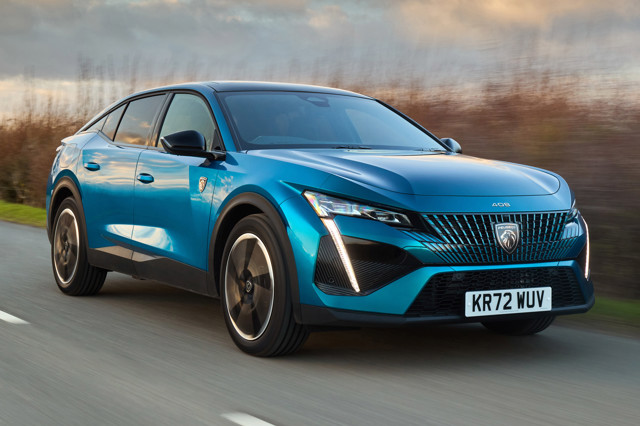
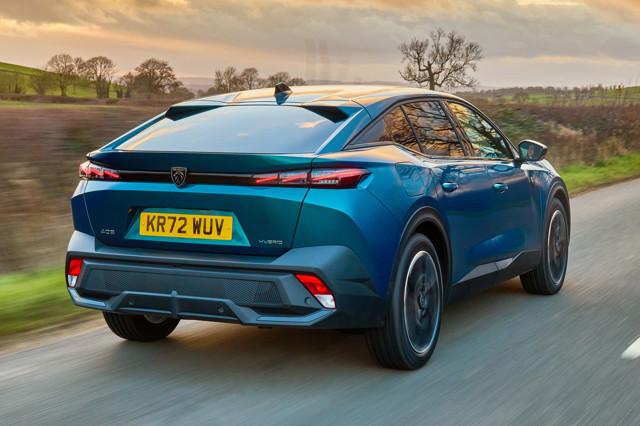
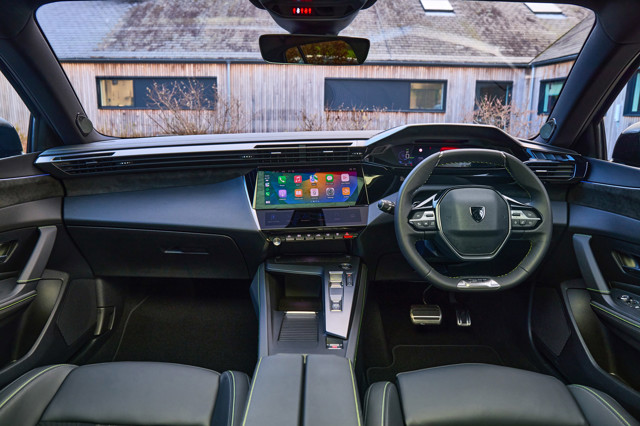
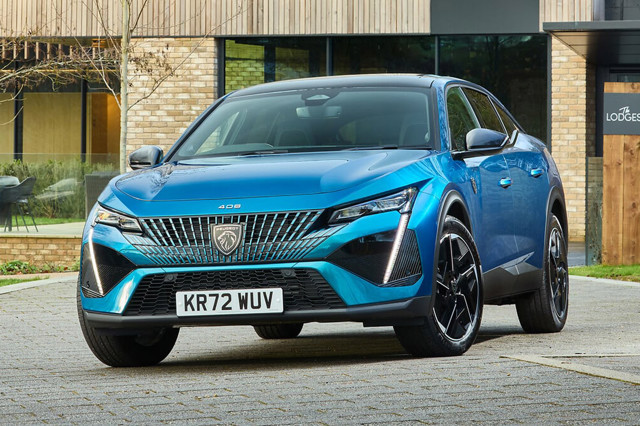
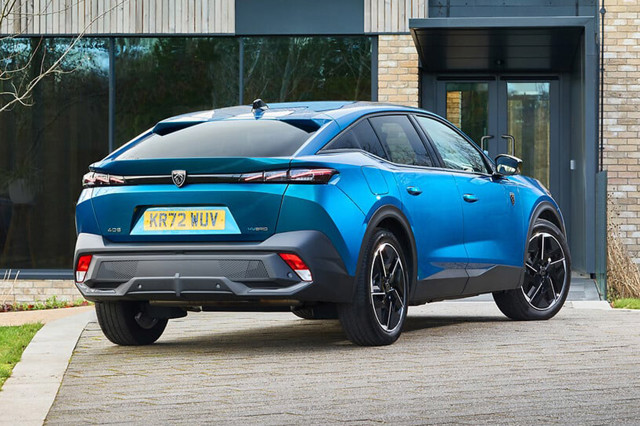
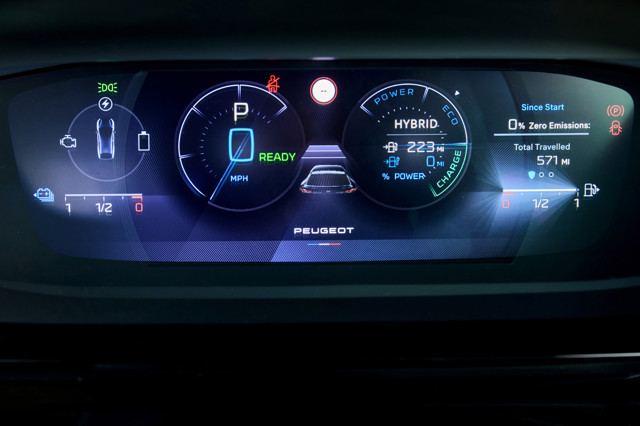
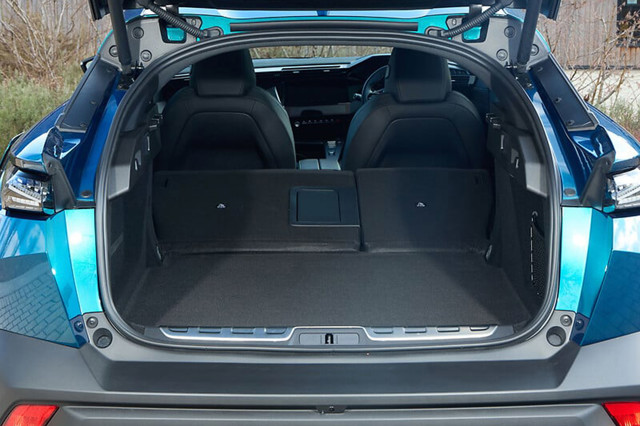


 Interesting alternative to mainstream SUVs like the Volkswagen Tiguan. Efficient engine range with an electric model to follow. High quality and spacious interior.
Interesting alternative to mainstream SUVs like the Volkswagen Tiguan. Efficient engine range with an electric model to follow. High quality and spacious interior.
 A conventional SUV is still a more versatile family car. Plug-in hybrids are quite expensive. Heated seats only available as part of an expensive options pack. Four-star Euro NCAP safety rating.
A conventional SUV is still a more versatile family car. Plug-in hybrids are quite expensive. Heated seats only available as part of an expensive options pack. Four-star Euro NCAP safety rating.



.jpg?width=240&height=160&rmode=crop)


